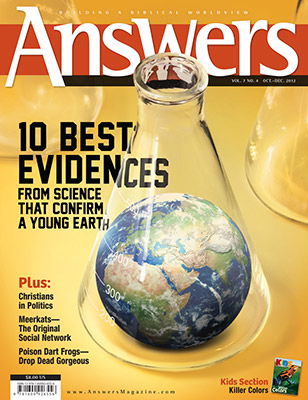
The Value and Limits of Scientific Evidence
Though the Bible is our foundation for understanding earth history, scientific “evidences” have a place. On the one hand, scientific findings don’t “prove” the Bible’s claims. (No one can absolutely prove the past because the study of origins involves “historical science,” not “observational science.”) On the other hand, they corroborate (confirm) what its divine author said. Thus, observational science can be used to confirm the Bible’s teachings.
So when you share how scientific information makes sense within the biblical framework, you are reminding your hearers that God is “clearly seen in the things He has made . . . so that they are without excuse” (Romans 1:20).
But be forewarned. Observational science is not ultimately what moves people to accept the truth about the earth’s age (1 Corinthians 12:3). Certainly, like Paul we need to “confute” and “powerfully dispute” and give reasons for what we believe. However, we cannot divorce that from the fact that “faith comes by hearing and hearing by the Word of God” (Romans 10:17).
We can use scientific evidences to defend the biblical worldview and point people to the bible. God then uses his word to change hearts and minds.
No amount of physical “evidence” will ultimately convince them if they don’t believe the Bible: “If they do not hear Moses and the prophets, neither will they be persuaded though one rise from the dead” (Luke 16:31). However, our responsibility is to “contend for the faith” and do the best we can to convince people of the truth of the Scriptures. We can use scientific evidences to defend the biblical worldview and point people to God’s Word, the Bible. God then uses His Word to change hearts and minds.
Rescuing Devices
When people who trust man’s words about an old earth run across scientific evidence for a young earth, they will not naturally blame their starting point. They generally assume an explanation exists but they don’t know it yet, or they will invent a solution, or “rescuing device,” that appears plausible to them. Because they are dealing with the unseen past, they can always come up with some unverifiable “excuse” to explain a particular scientific evidence that doesn’t seem to confirm billions of years.
So in every argument, expect counterarguments (even if they sound silly). The most common rescuing devices are summarized at the end of each “ten best” article. For more detailed answers, visit the web link on page 57. In the end, the “best evidence” is the Bible itself. God demands that we trust His infallible Word above the words of finite humans (Isaiah 2:22; Psalm 118:8). Conversion is a spiritual issue, but the Holy Spirit can use our gracious, Bible-filled words to draw hearers toward the Savior (Hebrews 4:12; John 12:32).
An analogy is Jesus’s raising of Lazarus from the dead. Jesus told people to take the stone away. He could have spoken one word to do that, but what humans can do, God expects us to do. What humans couldn’t do—raise Lazarus from the dead—the Word of our Creator did that! In sharing scientific evidences, we do our part to “take the stone away” (removing stumbling blocks). In doing so, we point people to the truth of the Word of God and pray that God will raise the “dead” (those dead in trespasses and sin).
Authors for The 10 Best Evidences from Science That Confirm a Young Earth
Answers Magazine
October – December 2012
God’s Word clearly teaches that the earth is young, and the evidence powerfully confirms it. So don’t miss this issue of Answers, which brings you up to speed on the ten best evidences for a young earth. Also discover incredible new examples of the Creator’s undeniable designs, a biblical view on political activism, the latest findings on the Dead Sea scrolls, and much more!
Browse Issue
Answers in Genesis is an apologetics ministry, dedicated to helping Christians defend their faith and proclaim the good news of Jesus Christ.
- Customer Service 800.778.3390
- Available Monday–Friday | 9 AM–5 PM ET
- © 2026 Answers in Genesis


